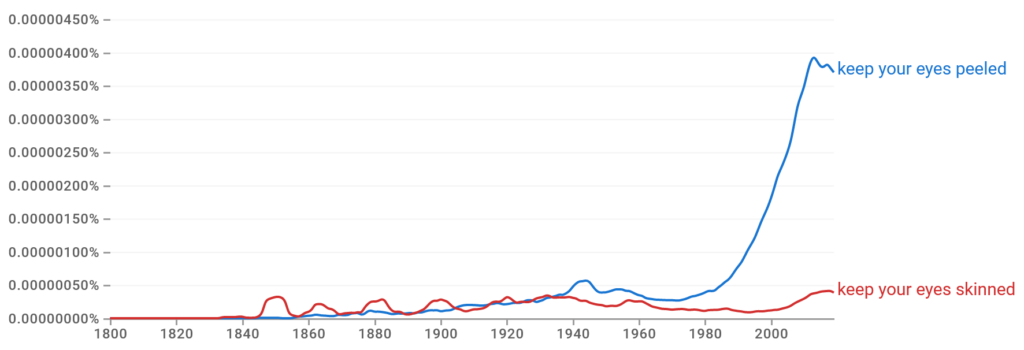Keep your eyes peeled or skinned is an idiomatic expression that means paying attention and staying vigilant. The phrase suggests figuratively removing a layer from your eyes to enhance perception, stressing the need to stay vigilant in different situations.
Idioms, like keep your eyes peeled, are expressions that convey meanings beyond their literal interpretation. These figurative phrases enrich the English language by adding layers of nuance and cultural context. They play a crucial role in communication, enabling speakers to convey complex ideas, emotions, or situations succinctly.
This article covers the idiom’s meaning and origins and provides ways to use it in various contexts through sentence examples, variations, and related terms. So, keep reading to help master your idiomatic usage and grammar skills. You can also take the quick quiz at the end to test your knowledge.

What Does the Idiom Keep Your Eyes Peeled Mean?
The idiom keep your eyes peeled means to stay alert and vigilant, paying close attention to your surroundings and remaining observant for details or developments. The phrase suggests a readiness to notice things that might be easily missed and emphasizes the importance of staying attentive in various situations.
Cambridge Dictionary defines the idiom keep your eyes peeled as “to watch carefully for someone or something.” Collins Dictionary expands on this, asserting that “if you tell someone to keep their eyes peeled for something, you are telling them to watch very carefully for it.”
Keep Your Eyes Peeled or Keep Your Eyes Skinned? What’s the Difference?
The British counterpart of keep your eyes peeled is keep your eyes skinned, though keep your eyes peeled has gained more popularity worldwide.
The reference seems somewhat literal: peeling back one’s eyelids or skining back one’s eyelids to see better.
Variations of the Idiom
These variations maintain the idea of being attentive, observant, and alert, suggesting the importance of paying close attention to notice or discover something.
- Keep your eyes skinned (British counterpart)
- Keep your peepers open
- Keep a sharp eye out
- Keep your gaze peeled
- Keep a weather eye out
- Keep your blinkers on
How Is Keep Your Eyes Peeled Commonly Used in Context?
The idiom keep your eyes peeled is a versatile phrase that finds frequent application in various situations. Whether navigating daily challenges, exploring new territories, or engaging in attentive observation, this idiom encapsulates the essence of remaining vigilant and alert.
Explore the following sections to gain a comprehensive understanding of how to seamlessly integrate keep your eyes peeled into your language toolkit.
What Are the Different Ways to Use Keep Your Eyes Peeled?
These examples illustrate the varied applications of keep your eyes peeled in different contexts, emphasizing attentiveness and readiness.
- Literal vigilance: While hiking, keep your eyes peeled for trail markers.
- Metaphorical awareness: In negotiations, keep your eyes peeled for subtle cues.
- Observational readiness: Driving in traffic, keep your eyes peeled for potential hazards.
- Task focus: During the project, keep your eyes peeled for efficiency improvements.
- Preventative watchfulness: In cybersecurity, keep your eyes peeled for potential threats.
- Opportunity recognition: In business, keep your eyes peeled for emerging trends.
Where Can You Find Examples of Keep Your Eyes Peeled?
Examples of the phrase keep your eyes peeled can be found in various written and spoken contexts, including:
- Literature and fiction
- Conversations and dialogues
- News articles and reports
- Online forums and discussion boards
- Instructional guides and manuals
Here are some examples from various online news and journal sources:
On your way back to Vis, keep your eyes peeled for a vineyard that sells wine (look for a sign that says “Vino”). (The Huffington Post)
And if you plan a spring trip, keep your eyes peeled for whales, which head southbound from Alaska to Mexico (volunteers can be found at Bodega Head to help spot whales and answer questions). (U.S. News & World Report)
Keep your eyes skinned for anyone on the bus making a parrot out of yarn while listening with a secret smile to their MP3 player. (The Daily Express)
What Are Some Tips for Using Keep Your Eyes Peeled Effectively?
When using the phrase keep your eyes peeled effectively, consider the following tips:
- Contextual clarity: Provide relevant details or background information to help others grasp why staying observant or attentive is important in that particular situation.
- Concise and direct: Avoid unnecessary elaboration or ambiguity that might dilute the impact of the expression.
- Specify the target: If there is something specific that you want others to look out for, provide clear instructions or details.
- Use in appropriate situations: Reserve it for contexts where being observant or attentive is genuinely important or necessary, such as safety, information gathering, or seizing opportunities.
What Is the Origin of the Idiom Keep Your Eyes Peeled?

The earliest use of the expression keep your eyes peeled is from the 1820s and is attributed to the first organized police force in Britain. Established by Sir Robert Peel, officers were called peelers or bobbies and were given orders to be explicitly vigilant on duty and to keep their eyes peeled for possible crimes.
Another possible origin stems from a play on words related to peeling a potato. In this analogy, the act of peeling the skin from a potato removes the eye, which is a tougher part of the vegetable. While both explanations are plausible, the exact origin of idioms can be complex and may involve multiple interpretations.
In America, the idiom was originally stated as keeping your eyes skinned. Its use is documented from 1833 in the Encyclopedia of Word and Phrase Origins by Robert Frederickson:
I wish I may be shot if I don’t think you had better keep your eyes skinned so that you can look powerful sharp…
How Did the Idiom Evolve Over Time?
Interestingly, the original phrase is keep your eyes skinned, documented in the United States in the 1830s. Over time, this evolved into the variant keep your eyes peeled in the United States, while keep your eyes skinned persisted as the original form in British English.
By the 1850s, keep your eyes peeled was already the more popularly used phrase within America. Its use is seen in the Evansville Daily Journal in 1856:
“Young man! Keep your eye peeled when you are after the women.”
What Are Some Related Terms to Keep Your Eyes Peeled?
Sometimes, the best way to fully understand how an idiom works is to look at terms related to the meaning of the expression. Synonyms and antonyms can be extremely helpful in providing context and use for your materials to ensure you are using it correctly.

Synonyms
- Stay vigilant
- Stay alert
- Stay watchful
- Stay observant
- Stay on the lookout
- Stay attentive
Antonyms
- Let your guard down
- Be oblivious
- Be inattentive
- Be unaware
- Be careless
- Be inattentive
Keep Your Eyes Peeled: Test Your Knowledge!
Choose the correct answer.
Let’s Review
From its roots in Britain’s inaugural police force under Sir Robert Peel to its evolution into a widely used idiom, keep your eyes peeled underscores the value of vigilance. This exploration covered its meaning, variations, and versatile applications in daily life.
Armed with insights into its origin and effective usage, you’re now poised to incorporate this idiom into your language repertoire. Test your knowledge with the provided quiz and continue mastering the art of idiomatic expression. Stay vigilant, stay engaged, and let “keep your eyes peeled” guide your observant journey.
